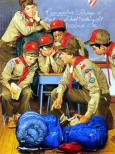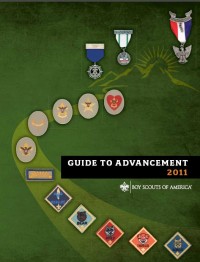 The new BSA Guide to Advancement lays out and clarifies what it takes for a troop to evaluate whether a Scout has satisfactorily served in a position of responsibility as required for the ranks beyond First Class.
The new BSA Guide to Advancement lays out and clarifies what it takes for a troop to evaluate whether a Scout has satisfactorily served in a position of responsibility as required for the ranks beyond First Class.
While this is primarily handled by the Scoutmaster and assistants, the final evaluation takes place at a board of review. In most cases, the Scoutmaster conference will determine whether the requirement has been satisfied, and the Board of Review can concentrate on other areas of a youth’s development. Continue reading “Fulfilling responsibility”





